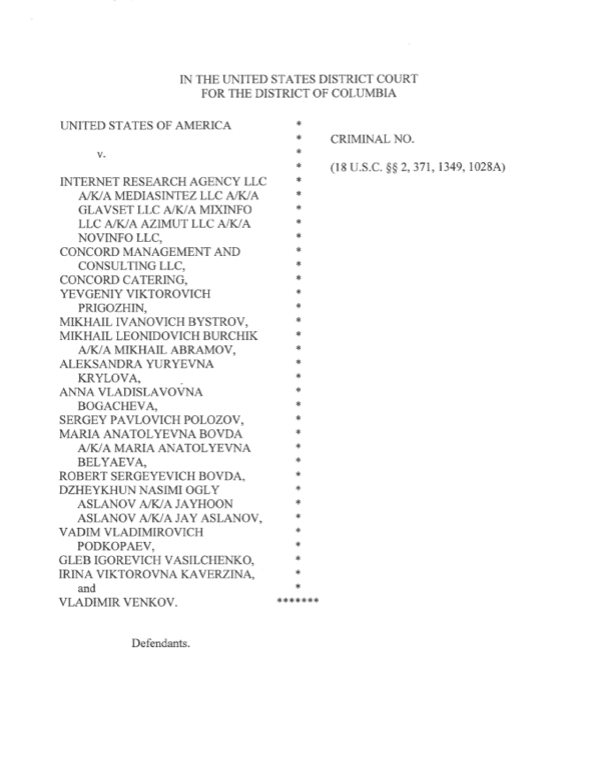BY JEREMY KUZMAROV
 Saturday’s New York Times featured an editorial entitled “The Russians are Coming [Again]” next to a photo of a campaign poster with Vladimir Putin wearing a Make America Great Again hat.
Saturday’s New York Times featured an editorial entitled “The Russians are Coming [Again]” next to a photo of a campaign poster with Vladimir Putin wearing a Make America Great Again hat.
The piece discussed Special Counsel Robert Mueller’s indictment of 13 Russian citizens for intending to “sow disorder” in the American political system by allegedly setting up fake social media accounts and buying ads promoting anti-Clinton messages and through political rallies organized under false fronts.
The editorial took President Trump to task for “denying the existence of a profound national security threat,” though acknowledged that Mueller’s new indictments did not “allege that any American knew about the influence campaign” or that the campaign had changed the outcome of the election.
No evidence was provided furthermore that Mr. Putin had anything to do with it.
The Times editorial is most misleading in its insinuation that the Russians are coming again.
Russia has never in reality invaded the United States, though the United States invaded Russia – in 1917 following the Bolshevik revolution in support of white counter-revolutionary armies.
This “Midnight War” was carried out illegally without the consent of Congress, and was opposed by the U.S. War Department and Commander in Siberia, William S. Graves. He expressed “doubt if history will record in the past century a more flagrant case of flouting the well-known and approved practice in states in their international relations, and using instead of the accepted principles of international law, the principle of might makes right.”
The United States had enjoyed good relations with Russia in the 19th Century, however, could not tolerate the Bolsheviks nationalization of industry, which threatened over $600 million of corporate investment. President Woodrow Wilson also feared the prospect of class revolution at home.
Congressional investigations depicted “Soviet Russia as a kind of bedlam inhabited by abject slaves completely at the mercy of an organization of homicidal maniacs whose purpose was to destroy all traces of civilization and carry the nation back to barbarism,” as historian Frederic Schuman put it.
Almost no publicity was given, by contrast, to atrocities committed by Admiral Kolchak, a key American ally in Russia’s civil war, whose men burned villages and, according to U.S. intelligence, executed 30,000 people in one year in Siberia as part of actions that would have been considered “shameful in the Middle Ages.”
Historian D.F Fleming wrote:
“For the American people, the cosmic tragedy of the intervention in Russia does not exist, or it was an unimportant incident, long forgotten. But for the Soviet people and their leaders, the period was a time of endless killing, of looting and raping, of plague and famine, of measureless suffering for scores of millions – an experience burned into the very soul of the nation, not to be forgotten for many generations if ever. Also, for many years, the harsh Soviet regimentation could all be justified by fear that the Capitalist power would be back to finish the job. It is not strange that in an address in New York, September 17, 1959, Premier Khrushchev should remind us of the interventions, ‘the time you sent the troops to quell the revolution,’ as he put it.”
The New York Times and other media pundits ought to consider the history of U.S. intervention in Russia a century ago and cease making like we are so innocent.
More recently, we interfered directly in their elections to help elect Boris Yeltsin, expanded NATO to their border in a violation of a previous promise, and supported a coup d’état and neo-Nazi backed regime in Ukraine, which prompted Putin’s annexation of Crimea.
Much of the hysteria about Russia today parallels the Cold War period when American politicians, academicians and the media raised ceaseless fears about Soviet aggression and perfidy, which in turn justified a massive escalation of the defense budget.
Conservative military figures including Dwight Eisenhower and Herbert Hoover had been among those to point out that the Russians had been decimated by World War II and were not planning for future conquest, apart from seeking a security buffer in Eastern Europe.
A study by Ruth Leger Sivard analyzing 125 military conflicts from 1946-81 found that “Western powers accounted for 79% of the interventions, communists for 6%,” with the latter being mostly near their border.
We should keep the history in mind as we process the current politicized hysteria, and repudiate the Russo-phobic alarmism that is driving us towards a new Cold War.
– Jeremy Kuzmarov teaches at the University of Tulsa and is author of several books, including the forthcoming, The Russians are Coming Again: the First Cold War as Tragedy, the Second as Farce [New York: Monthly Review Press, 2018].








